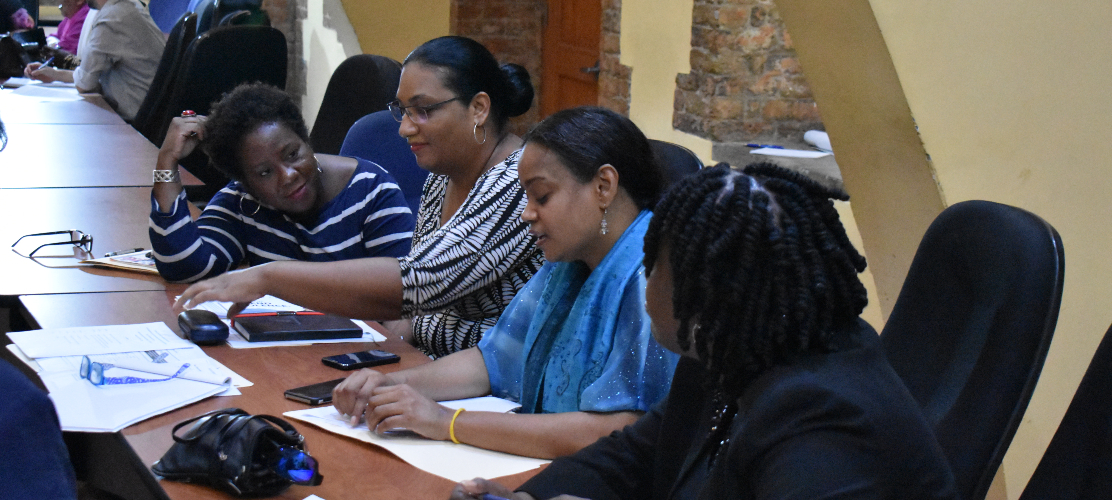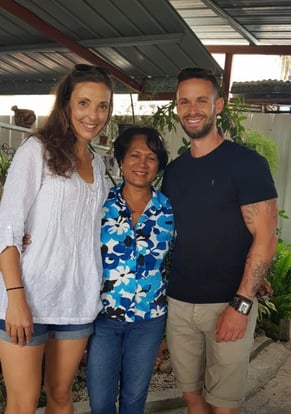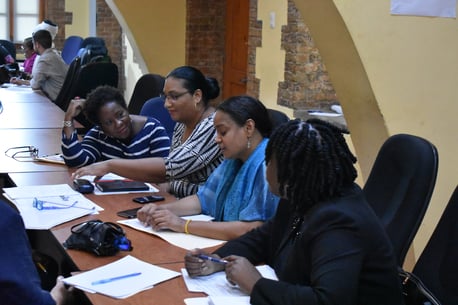From Gang Member to Peacebuilder: Lessons From My Kroc School Summer Internship

From Gang Member to Peacebuilder: Lessons From My Kroc School Summer Internship

begin quoteI wanted to better understand the intersections of hypermasculinity and trauma as it relates to violence in our communities.
“Some time ago, when I met Sabrina Mowlah-Baksh, former Mayor of San Fernando (the second largest city in all of Trinidad), and now one of the 2018 Women PeaceMakers, she and I connected right away. ‘Something about our souls…’ she said.
"Listening to her explain how gangs and domestic violence, toxic masculinity if you will, had taken her home by storm, I resonated with her anguish. Despite us living worlds apart, we were both trying to wrap our minds around the same challenge — the same issue a world apart from one another. There must be some common denominator, right?”

Kroc Institute for Peace and Justice Associate Director and Professor Jen Freeman, 2017 Women PeaceMakers fellow Sabrina Mowlah-Baksh, and Kroc School student Austin Galy.
My Peacebuilding Origins
It was the summer before my first year as a Master’s in Peace and Justice student at the Kroc School, and I remember how frustrated I was about not knowing which class to take as my elective. How on earth does one choose between courses titled, “Drones for Peace,” and “War, Gender, and Peacebuilding”? As if either of them sound even remotely dull. Three add/drops later, I somewhat reluctantly chose the latter. Much of that decision had to do with my focus on gender as I entered the program. The other aspect that shaped my decision was that my esteemed mentor, Professor Jennifer Freeman (aka Jen), was co-teaching the course with five incredible women. One was another professor in the Political Science Department, Dr. Karen Shelby, and the other four were the 2017 appointed Women PeaceMakers. Sorry, “Drones for Peace” – it’s nothing personal, but how do you compete with that?
Thanks to the “War, Gender, and Peacebuilding” course, I had the true privilege of crossing paths with one of the more phenomenal human beings I know. Her name is Sabrina Mowlah-Baksh, and she is one of four 2017 Women PeaceMakers fellows at the Kroc Institute for Peace and Justice. Sabrina is many things. For starters, she’s unapologetic, resilient, brave, perfectly imperfect, but most importantly, she is caring. She cares for her home country of Trinidad and Tobago with a fiery passion that is unparalleled, and nothing will ever stand in the way of her community.
The following Spring 2018 semester, after months of keeping in touch via Facebook and WhatsApp, I secured a summer internship in which I would eventually get to assist Sabrina and Professor Freeman on a “localization forum” that Sabrina was hosting as part of her Women PeaceMakers fellowship. The purpose of the forum was to assemble international diplomats, donors, NGOs and grassroots organizations in Trinidad as part of a nationwide effort to build more effective collaborations between local and international peacebuilders.
I spent the first half of the summer coordinating that event in Trinidad, and couldn’t have been more delighted by the learning opportunity it provided to all involved. To be in a space of such powerful and resilient women, all of whom are making an impact on their communities worldwide, was not only profound, but inspiring. In a field that has been dominated by men for so long, centering both the voices and contributions of women in peacebuilding is, well, necessary. Sometimes, or perhaps all the time, men just need to get out the way.

Peacemakers at the Localization Summit in Trinidad and Tobago.
Redefining Masculinity Is a Global Effort
Apart from my role in assisting Sabrina with the localization forum, the other half of my internship experience in Trinidad gave me the autonomy to explore and work alongside community members who are actively seeking to better understand issues of violence in their communities. Part of my initial draw to Trinidad and Tobago, including the most pressing challenges it’s been facing, was to the incredible parallel it shares with my own community in the United States. As a formerly incarcerated gang member myself, there isn’t a day that passes where I don’t seek redemptive healing in my work to unpack the whys behind this global challenge. These obstacles are beyond personal for me – they are lived, they are felt, and the scars left behind by them hurt daily. The same sort of hurt I recognized in the eyes of Sabrina is what I felt, and it’s the same hurt that I saw and felt from people all across Trinidad and Tobago. Violence doesn’t use discretion when it comes to pain.
It’s not just gang violence, however. The epicenter of this pain stems from a far deeper and more painful truth, and that is gender-based violence — a sort of violence that has become pervasive across the globe, with the least common denominator being none other than patriarchy. Feminist author bell hooks once said, “To build community requires vigilant awareness of the work we must continually do to undermine all the socialization that leads us to behave in ways that perpetuate domination.” If socialization has led us to believe that somehow masculinity is predicated upon one’s ability to embody violence and aggression, then guess what… there is work to be done.
We must challenge this primal archetype and exhaust all efforts to educate our young men that mainstream definitions of masculinity are not a standard to live up to, and that engaging in healthy behaviors of speaking and feeling and expressing one’s emotions should never threaten or subvert one’s claim to manhood. The work to be done in communities across Trinidad and Tobago and across Atlanta, Ga., my hometown, is to create spaces that allow for a healthy redefining of masculinity.
I applied to USD’s Kroc School for this reason alone: I wanted to better understand the intersections of hypermasculinity and trauma as it relates to violence in our communities. Again, this confluence rears itself in so many ways, yet my experience in Trinidad and Tobago, working and learning alongside community members, reaffirmed that, yes, this is indeed a global challenge. Just as it takes a village to raise a child, “un-learning” the various toxic behaviors that perpetuate gender-based violence will also require buy-in from all members of society – a total redefinition. After all, expectations dictate actions, not the other way around.
While in Trinidad and Tobago, Jen and I had the pleasure of sharing a bit of our research on Trinidad and Tobago's largest local television morning show. In it, we speak about the influence of hypermasculinity on patterns of violence in the small Caribbean nation.
There’s the Classroom, and Then There’s Being on the Ground
What I’ve shared thus far hardly scratches the surface of my experience working in Trinidad and Tobago. In honor of the many complexities that arise during international peacebuilding work, I’d like to offer a handful of quick tips for fieldwork that I have found to be particularly relevant both in my own community and abroad.
5 Tips for Fieldwork
- Power, privilege, and social location: awareness is everything. Always be mindful of how your social location affects or influences those around you, both directly and indirectly.
- Relationships, relationships, relationships — without them, you have nothing. Invest your time into relationship building everywhere you go.
- Sabrina said, “There’s a difference between charity and development work.” Sustainable peacebuilding efforts take time. Don’t let money, or the expectations and pressure that comes with it, dictate your morality.
- Peacebuilding doesn’t occur in a vacuum, so learn to be okay with uncertainty. The goal is never to “fix,” it’s to better understand.
- Deference is a thing — learn it. We’re tightrope walkers, always skirting boundaries of cultural sensitivity and human rights. There are times to speak, and there are times to listen. Let the “long game” dictate your choice one way or the other.
One must always keep in mind that there’s no such thing as a formula for peacebuilding. It simply doesn’t work that way. No amount of knowledge or prep work can ever fully prepare you for your experiences on the ground. Again, learn to be okay with that. Remember to always keep in mind the bigger picture, yes, but never forget to cherish the small victories along the way. They matter… as do you.
Want to advance your education and career as a peacebuilder? Learn more about the Master’s in Peace and Justice at the Kroc School.
The previous post comes from Kroc School Master's in Peace and Justice student Austin Galy.
Contact:
Kevin Dobyns
kdobyns@sandiego.edu
(619) 260-7618

About the Author
The Joan B. Kroc School of Peace Studies (Kroc School) at the University of San Diego is the global hub for peacebuilding and social innovation. Founded in 2007, the Kroc School equips the next generation of innovative changemakers to shape more peaceful and just societies. We offer master's degrees in peace and justice, social innovation, humanitarian action, conflict management and resolution, and a dual degree in peace and law — programs that have attracted diverse and dynamic students from more than 50 countries. In addition to our graduate programs, the Kroc School is home to the Kroc Institute for Peace and Justice (Kroc IPJ). Founded in 2001, the Institute supports positive change beyond the classroom. Through groundbreaking research, experiential learning, and forward-thinking programs, the Kroc School and Kroc IPJ are shaping a future in which peaceful co-existence is the new normal.





